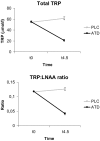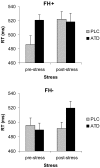Effects of acute tryptophan depletion on affective processing in first-degree relatives of depressive patients and controls after exposure to uncontrollable stress
- PMID: 18551283
- PMCID: PMC2493867
- DOI: 10.1007/s00213-008-1125-8
Effects of acute tryptophan depletion on affective processing in first-degree relatives of depressive patients and controls after exposure to uncontrollable stress
Abstract
Rationale: Individuals with a family history of depression may be more likely to develop depression due to an innate vulnerability of their serotonergic system. However, even though serotonergic vulnerability may constitute a risk factor in the development of depression, it does not seem to be sufficient to cause a depressive episode. Based on previous data, it is suggested that stress may be a mediating factor.
Objectives: This study examined the role of serotonin (5-HT) in stress coping in individuals with or without a family history of depression.
Materials and methods: Nineteen healthy first-degree relatives of depressive patients (FH+) and 19 healthy controls without a family history of depression (FH-) were tested in a double-blind placebo-controlled design for affective processing under acute stress exposure, following acute tryptophan depletion (ATD) or placebo.
Results: Significant negative effects were found of stress on affective processing in FH- and FH+. In addition, FH- responded slower to positive words after stress only following ATD, whereas FH+ responded marginally slower under stress already after placebo and before stress following ATD.
Conclusion: Acute stress exposure reduces positive affective bias; supporting the role of stress as an important predecessor in the development of depression. Furthermore, FH+ may be more susceptible than FH- to the negative effects of stress as well as to the negative effects of ATD. The results support the assumption that the 5-HT system is involved in stress resilience and may be more vulnerable in first-degree relatives of depression.
Figures



Similar articles
-
Differential effects of 5-HTTLPR genotypes on mood, memory, and attention bias following acute tryptophan depletion and stress exposure.Psychopharmacology (Berl). 2009 May;203(4):805-18. doi: 10.1007/s00213-008-1428-9. Epub 2008 Dec 16. Psychopharmacology (Berl). 2009. PMID: 19083208 Clinical Trial.
-
Effects of acute tryptophan depletion on mood and cortisol release in first-degree relatives of type I and type II bipolar patients and healthy matched controls.Neuropsychopharmacology. 2002 Nov;27(5):834-42. doi: 10.1016/S0893-133X(02)00345-7. Neuropsychopharmacology. 2002. PMID: 12431857 Clinical Trial.
-
Acute tryptophan depletion in healthy young women with a family history of major affective disorder.Psychol Med. 1999 Jan;29(1):35-46. doi: 10.1017/s0033291798007685. Psychol Med. 1999. PMID: 10077292 Clinical Trial.
-
Review: Serotonin by stress interaction: a susceptibility factor for the development of depression?J Psychopharmacol. 2007 Jul;21(5):538-44. doi: 10.1177/0269881106075588. Epub 2007 Apr 19. J Psychopharmacol. 2007. PMID: 17446201 Review.
-
Sex differences in the effect of acute tryptophan depletion on declarative episodic memory: a pooled analysis of nine studies.Neurosci Biobehav Rev. 2007;31(4):516-29. doi: 10.1016/j.neubiorev.2006.11.009. Epub 2007 Jan 16. Neurosci Biobehav Rev. 2007. PMID: 17229463 Review.
Cited by
-
Cognitive Performance in First-Degree Relatives of Individuals With vs Without Major Depressive Disorder: A Meta-analysis.JAMA Psychiatry. 2019 Mar 1;76(3):297-305. doi: 10.1001/jamapsychiatry.2018.3672. JAMA Psychiatry. 2019. PMID: 30586133 Free PMC article.
-
Differential effects of 5-HTTLPR genotypes on mood, memory, and attention bias following acute tryptophan depletion and stress exposure.Psychopharmacology (Berl). 2009 May;203(4):805-18. doi: 10.1007/s00213-008-1428-9. Epub 2008 Dec 16. Psychopharmacology (Berl). 2009. PMID: 19083208 Clinical Trial.
-
Empathic accuracy and oxytocin after tryptophan depletion in adults at risk for depression.Psychopharmacology (Berl). 2016 Jan;233(1):111-20. doi: 10.1007/s00213-015-4093-9. Psychopharmacology (Berl). 2016. PMID: 26462806 Free PMC article. Clinical Trial.
-
Affective cognition and its disruption in mood disorders.Neuropsychopharmacology. 2011 Jan;36(1):153-82. doi: 10.1038/npp.2010.77. Epub 2010 Jun 23. Neuropsychopharmacology. 2011. PMID: 20571485 Free PMC article. Review.
-
Brief Report: Intact Cognitive Functions in Children and Adolescents of Parents With Mood Disorders.Early Interv Psychiatry. 2025 Apr;19(4):e70042. doi: 10.1111/eip.70042. Early Interv Psychiatry. 2025. PMID: 40229975 Free PMC article.
References
-
- Arrindell WA, Ettema JHM (1986) SCL-90. Een multidimensionel psychopathologie indicator [SCL-90. A multidimensional indicator of psychopathology]. Swets en Zeitlinger, Swets en Zeitlinger
-
- Beck AT, Ward CH, Mendelson M, Mock J, Erbaugh J. An inventory for measuring depression. Arch Gen Psychiatry. 1961;4:561–571. - PubMed
-
- Benkelfat C, Ellenbogen MA, Dean P, Palmour RM, Young SN. Mood-lowering effect of tryptophan depletion. Enhanced susceptibility in young men at genetic risk for major affective disorders. Arch Gen Psychiatry. 1994;51:687–697. - PubMed
-
- Blokland A, Lieben C, Deutz NEP, Schmitt J. Acute tryptophan depletion: comparing the effects of an amino acid mixture with a gelatin-based protein in man and rats. Curr Top Nutraceutical Res. 2004;2:161–169.
Publication types
MeSH terms
Substances
LinkOut - more resources
Full Text Sources
Medical
Research Materials
Miscellaneous

